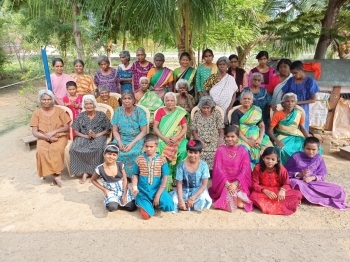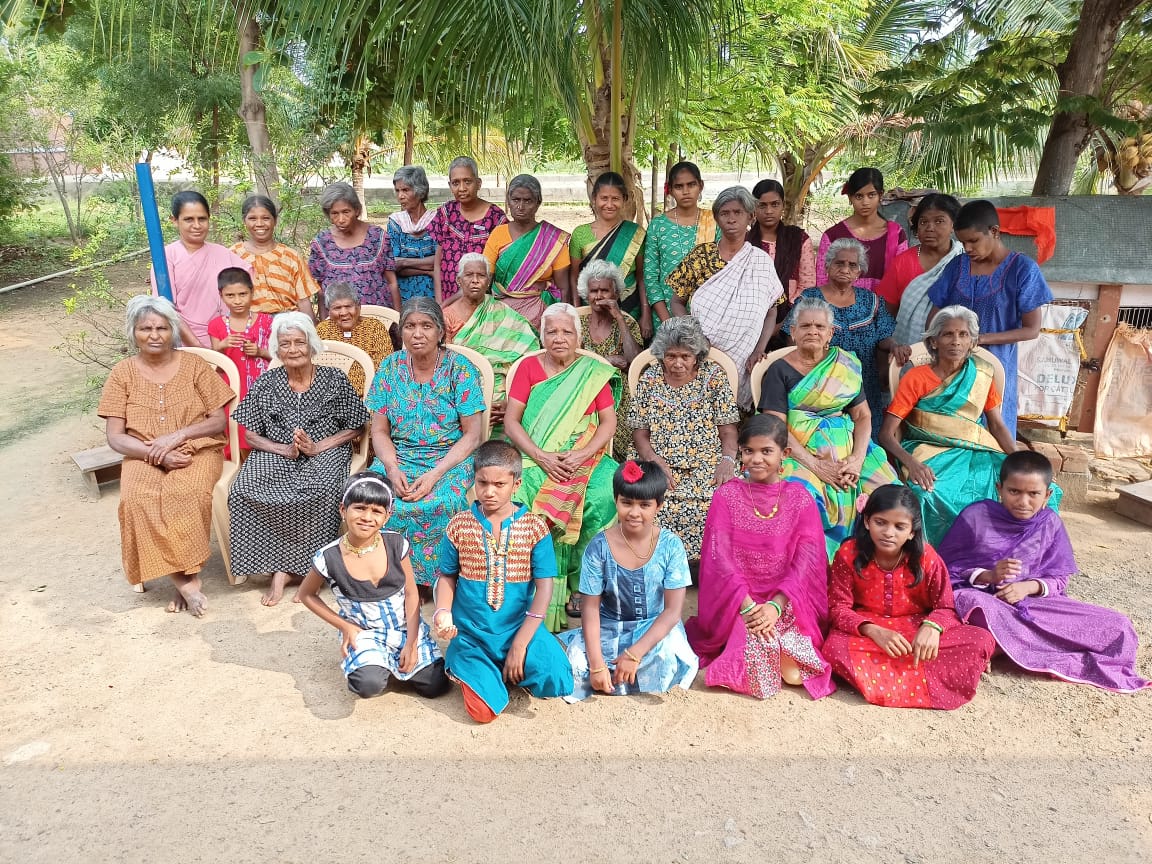
.png) M L Satyan
M L Satyan

Mother Teresa Rural Development Trust was started in 2011 by Sr. Maria Rethna to serve the aged women neglected by their families and society and orphan/semi-orphan children to help them lead a dignified life. The purpose of keeping both the aged women and the children in the same campus is to create a “bond of love” between them. The aged women consider the children as their ‘grandchildren’ and the children consider the women as their ‘grandmothers’.
Maria Rethna was born in 1972 in Kanyakumari district and completed her studies in her village. In 1988 she joined a local congregation named Sisters of the Sacred Heart of Jesus (SSHJ). She took her first vows in 1991 and the final vows in 1997. She served in various places in Tamil Nadu and Andhra Pradesh.
She held various responsibilities and accomplished her work successfully. Yet, she could not find fulfilment. There was an inner urge to move beyond. Her role model was Mother Teresa and she wanted to serve the poor and needy people like her. She was not given an opportunity by the congregation. After prayerful discernment and due permission from her authorities, she left the congregation. She chose a remote village named Kalmanikapuram, stayed in a small hut and tried to serve the aged women in that village.
Her family/Trust members and relatives helped her to buy 3 acres of barren land in that village and build a home for the aged women in 2013. Today there are 25 aged women residing in this home. Later, a shelter home for the orphan/semi-orphan girls was started.
There are 10 children and they study in the nearby schools. Both the homes are registered under the state social welfare board.
Sr. Maria Rethna continues to be a “secular nun” fully dedicated to the service of the needy people. Just like Mother Theresa and her sisters, she goes to the market and literally begs from the vegetable shops and provision stores without any inhibition. The shop-keepers give whatever she wants. When she gets some donation, she pays them. Besides, she also visits nearby villages and towns, goes from house to house to seek help (to beg) from families for the Trust.
The Trust is being managed “only with the local contributions” from generous people of good-will. With the support of some philanthropists, she renovated the Home for the aged, built a new kitchen and dining and the Children’s Home. Now, a small Prayer Hall is under construction. She has three staff to assist her. The local people have started appreciating her dynamism, commitment and spirit of selfless service. On the occasions of Birthdays, Weddings, House-warming ceremonies, Wedding/Death Anniversaries the local people come and offer meals to the inmates of these Homes. Some people make generous donations of furniture, household items, clothes, sanitary items, kitchen utensils and stationery items to the Trust.
Initial challenges
After the Home for the aged was built, the rich men in that village instigated the villagers and VHP and made false accusations against Sr. Rethna that she was converting the women to Christianity. They filed several complaints at the local Police Station. The instigated villagers threatened to demolish the Home for the aged, planned to chase Sr. Rethna from that place and kill her. In spite of all these challenges and obstacles, she managed to face them with courage, will-power and continued the mission entrusted to her by God.
Home for the Aged
The home provides food, clothes and shelter to the aged women. Through special care and counselling, the aged women are made to feel that they are wanted. They are helped to live with dignity. The women participate in activities like prayer, counselling, medical check-up and motivational sessions. Those who are active, help in household activities like house cleaning, cutting vegetables, cooking, washing utensils and garden work.
Vidal Shelter
In Tamil “Vidal” means “Adolescent”. Presently 10 orphan/semi-orphan girls children reside here. They go to the nearby school and study. The Home gives ‘care and affection’ that they rarely get from their own families. They are trained in cultural activities like singing, music, dance, drama etc. They learn yoga and meditation. Every child’s birthday is celebrated. Picnics are organized at regular intervals. They are also taught to imbibe values such as honesty, responsibility, cleanliness, self-confidence, respect for others especially elders, selfless love, spirit of service and self-discipline etc. For the children this is a “Home away from Home”.
Helping the differently-abled
The Trust identifies the differently-abled children who are neglected by their families. The Trust counsels, motivates the parents and helps them to show their parental love to such children. Required support is provided by the Trust to help the differently-abled persons live with self-respect and dignity.
Women development programs
In the past, Self-Help-Groups (SHG) were formed for women from poverty-stricken families. They were helped to start small-scale income generating programs and savings in the bank. The women also attended tailoring classes and developed their stitching skill. An opportunity was given to them to earn money, become self-reliant and lead a respectable life in the society.
Presently, the Trust continues to run the Tailoring Centre in the town where the women learn stitching and embroidery. They also come to the Home for the Aged to attend Counselling Sessions on a regular basis. They are given awareness on health and hygiene, HIV/AIDS, preventive measures, family life and communal harmony etc.
Support to abandoned women
In today’s society there are many women who are abandoned by their lovers/husbands/relatives. They face quite a lot of difficulties and challenges in their life. The Trust welcomes such women, provides regular counselling to heal their psychological wounds, instils in them self-confidence, motivates and helps them to lead their life with a renewed energy. Traditional ceremonies are conducted for woman who is pregnant and help her get reunited with her husband. With the support of lawyers and local Police, an unwed mother is helped to marry the man who has abandoned her. Women with families are helped to get re-united with them (children, husbands and relatives).
(Contact Details: Sr. Maria Rethna, Mobile.9894249373; E-mail: toserveallpeople@gmail.com)